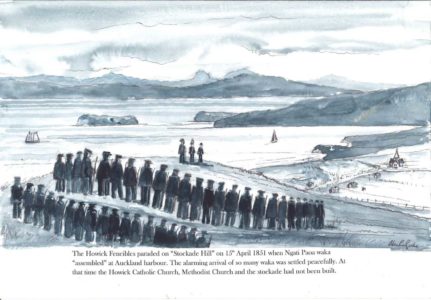We continue the series marking the Howick district’s 170th anniversary with insights from historian Alan La Roche
 On April 14th 1851, a Thames Maori called Ngawiki was arrested by a Maori policeman who was with a pakeha policeman, after Ngawiki had stolen a shirt from a shop in Shortland Street, Auckland.
On April 14th 1851, a Thames Maori called Ngawiki was arrested by a Maori policeman who was with a pakeha policeman, after Ngawiki had stolen a shirt from a shop in Shortland Street, Auckland.
But during the scuffle that followed, Te Hoera, a Maori chief of Ngati Paoa of Waiheke was hit on the head by the Maori policeman’s baton.
Hitting a Maori chief on the head violated Maori protocols. On the 17th April Ngati Paoa had gathered support from Ngati Whanaunga and Ngai Tai iwi as they landed at Waipapa Beach [at the end of Stanley Street of today] with 250 to 300 armed warriors on six large war canoes and 25 smaller canoes to seek utu or revenge on the Maori policeman.
Some pakeha feared this could be a major Maori invasion of Auckland. Three companies of the 58th Regiment with four field artillery cannons and the warship HMS Fry anchored off-shore moved closer and aimed cannons on those on the beach.
The Onehunga Fencibles armed with fixed bayonets marched to Auckland and took up positions near today’s High Court on Constitution Hill.
The Otahuhu Fencibles guarded the Otahuhu portage, while the Panmure Fencibles watched the Tamaki River punt for any other Maori warriors.
The Howick Fencibles heard the bugle call to arms and paraded in Picton Street soon after the mounted messenger arrived from military officers in Auckland.
Captain Alexander MacDonald sent one detachment to the top of Stockade Hill, another detachment was sent to Minerva Terrace.
Howick was treeless at that time with good views over the country side. Another detachment scout party went to the Mangemangeroa with strict instructions “to disarm all Maori they encountered”. The Howick Fencibles saw no unfriendly Maori.
The Fencibles all had musket rifles but were never given ammunition as they might use it to shoot birds for food. Captain MacDonald borrowed some rounds of ammunition from the Howick Armed Police Force who were mostly Maori constables.
It was illegal for Europeans to sell rifles and ammunition to Maori who generally had old rifles and double-barrelled shotguns.
They needed ammunition for hunting purposes which was sparingly issued. Some Maori made their own gunpowder, or smuggled it from “friendly pakeha” or bought it from whaling ships offshore.
The Howick Fencibles were kept on duty for 12-to-14 hours overnight. Wives took meals to the men. Those on Stockade Hill were especially cold and miserable.
At Waipapa Beach in Auckland, angry warriors were in a state of excitement, not to destroy the pakeha town but to catch the Maori policeman for a traditional Maori punishment. The officials demanded that all arms be given up and leave; comply or be fired upon! But the tide was going out leaving the canoes high and dry. The crestfallen “invaders” hauled their heavy canoes over the mudflats to the sea.
Ngai Tai chief Tara Te Irirangi of Maraetai with other chiefs met Governor Sir George Grey to express their regret over the incident. He gave the Governor a precious greenstone mere [which is now in Auckland Museum] with other taonga. In return the Governor gave the chiefs tobacco, blankets and food and they all returned home in peace.
The Maori shirt-stealer Ngawiki, the cause of the incident, was sentenced to three months imprisonment. When he was released, he was called Toru-Marama or ”Three- months”.
This incident was a favourite topic of pub-talk for Fencibles for many years.
Alan La Roche, Howick Historian











